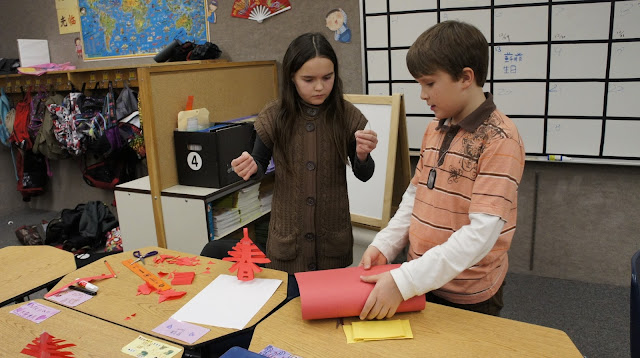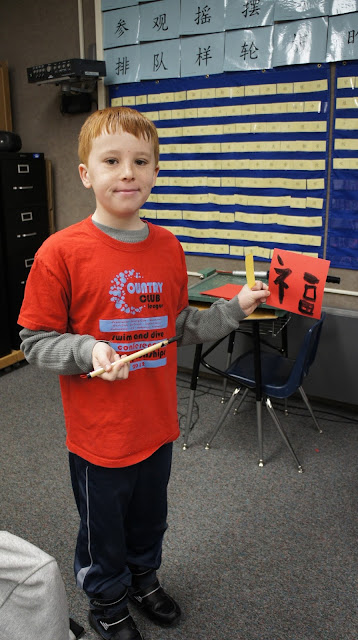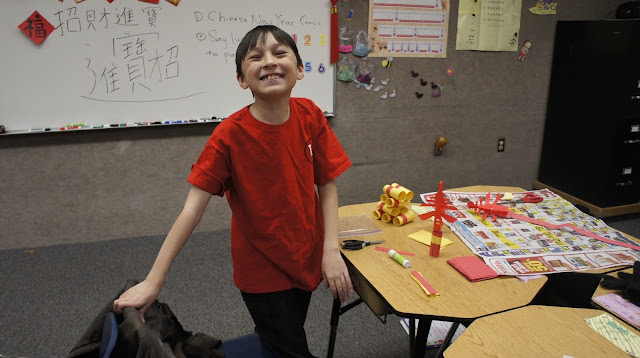Upcoming Events
Career Day: February 26th
Wax Museum: February 27
Dual Immersion Meeting: February 27
Early Day out: February 28, 29
Science Unit Test: Rocks and Soil: March 4.
Parent Teacher Conference: March 7 and 8
Spring Recess: March 23- March 31
2/25
1. Fix Blue Book L10 (Due 3/1)
2. Read L10 Stories 3X
3. Read Science Vocabulary 3X
2/26
1. Fix week 26 test (fix, sign and return)
2. Read L10 Stories 3X
3. Read Science Vocabulary 3X
Wax Museum tomorrow.
- Our Chinese Learning Wonderland
- Our Online Textbook
- Level 3 Textbook Stories
- Level 3 New Words
- Level 3 Test Samples
- Stroke Order Animation and Dictionary
- Daily Schedule
- Our Online Learning Lessons
- Utah Chinese Dual Language Immersion
- Instruction for Reading our Textbook Stories online
- Science
- Videos
- Chinese Poems 1-5
- Chinese Poem 6-10
- Taiwan
- Utah Mandarin Immersion Parent Council
Tuesday, February 26, 2013
Monday, February 25, 2013
Science Vocabulary list and Week 27 Chinese test sample now updated
Hi
I have updated our science vocabulary list for Rocks and Soil. They are the words you will need to know to understand to the science knowledge in this unit and to prepare for the test.
There are both a written list and an audio demonstration of the vocabulary for you.
Please check it out in the "Science" section.
The Unit Test will be on March 4 (Monday).
For Chinese test sample, please see "Level 3 Test Samples"
I have updated our science vocabulary list for Rocks and Soil. They are the words you will need to know to understand to the science knowledge in this unit and to prepare for the test.
There are both a written list and an audio demonstration of the vocabulary for you.
Please check it out in the "Science" section.
The Unit Test will be on March 4 (Monday).
For Chinese test sample, please see "Level 3 Test Samples"
Saturday, February 23, 2013
Lantern Festival
元宵节(元宵節) Yuán Xiāo Jié
The fifteenth of January on the Lunar calendar is Chinese Lantern Festival. It's an extended celebration of Chinese New Year. (It's on February 23, 2013, but while I am writing this article, it has passed the mid night in Asia. It's still Lantern Festival here though to the Chinese people here.)
We eat round dumplings, called Yuan Xiao, which are made with sticky rice. They can be sweet and can be salty. The size of Yuan Xiao is like a golf ball. We usually fill ground peanuts, sesame paste or cooked sweetened red beans inside of Yuan Xiao.
You can also make Yuan Xiao like traditional Chinese soup. We then fill meat inside and add vegetables in the soup.
The fifteenth of January on the Lunar calendar is Chinese Lantern Festival. It's an extended celebration of Chinese New Year. (It's on February 23, 2013, but while I am writing this article, it has passed the mid night in Asia. It's still Lantern Festival here though to the Chinese people here.)
We eat round dumplings, called Yuan Xiao, which are made with sticky rice. They can be sweet and can be salty. The size of Yuan Xiao is like a golf ball. We usually fill ground peanuts, sesame paste or cooked sweetened red beans inside of Yuan Xiao.
You can also make Yuan Xiao like traditional Chinese soup. We then fill meat inside and add vegetables in the soup.
Another activity we do on Lantern Festival is going to a Lantern Fair. There are always wonderful lantern fairs at city halls, citizen squares or parks in different cities. They usually exhibit beautiful and delicate lanterns with the specific theme: the animal of the year. Young kids will also carry their own handmade lantern to the fair. Lantern riddles is also a game we play on that day. The questions are written on the lanterns and we pick one to answer. The answers are mainly about Chinese words, idioms or names of places. To answer the questions, you have to pay attention to the hidden clues in the questions.
Sky Lantern
A sky lantern is made of wooden frames and thin paper. We write wishes on it with brush pens and light up the 金纸 /jīn zhǐ /(golden paper) inside it to make hot air fill the lantern so it rises to the sky.
There are different versions of Yuan Xiao Stories, but mainly it's about families getting together. Here are two similar versions of stories, one is Chinese only and the other one has Chinese and English subtitles.
Friday, February 22, 2013
2/19-2/22 Homework
2/19
1. Study week 26 test. It will be on NEXT MONDAY. They will have a sample today.
2. Write Blue Writing Book (Due 2/22 Friday).
3. Read L10 new words 3 times. (Oral quiz on 2/22 Friday.)
4. Bring L10 yellow flashcards.
L10 New vocabulary, stories and a test sample were all uploaded. Please see different sections on the top of the blog homepage. L9 will be skipped first.
2/20
1. Read L10 new words 3 times
2. Read Chinese Poem 6 (See http://www.blogger.com/blogger.g?blogID=1696187660301626037#editor/target=page;pageID=5425056394324291098)
3. Dual Immersion Meeting is on February 27 (Wednesday). All parents are invited. We will be very happy to see you then.
2/21
1. Wear Blue (NO BULLYING)
2. Bring Blue Book (Finish L10)
3. Oral quiz: L10 vocabulary
4. Read L10 new words.
Some words do not match their sounds in the blue book. This is due to the computer program; there seems to be some bug for generating worksheets. I tried to fix it but failed. I am not sure what caused it. But this mistake doesn't happen to our flashcards and the yellow writing book we use at school. When you study, please use the flashcards you have and correct the mistakes in the blue writing book.
2/22
1. Read L10 vocabulary 3X
2. Week 26 test on Monday (2/25)
3. Chinese Poem 6 (Complete, read, sign, return and oral quiz on Monday.)
4. Comic (If you forgot to take a comic form from school, just get a blank paper to do the home work. Use the Chinese you have learned.)
5. They got a Chinese science vocabulary list from me today. They are the words students need to be familiar with (no need to practice writing) in order to understand science lessons. They can start studying now. The unit test will be on March 4 and the full vocabulary list will be ready for them on Monday too. You can also find the list in "Science" section.
1. Study week 26 test. It will be on NEXT MONDAY. They will have a sample today.
2. Write Blue Writing Book (Due 2/22 Friday).
3. Read L10 new words 3 times. (Oral quiz on 2/22 Friday.)
4. Bring L10 yellow flashcards.
L10 New vocabulary, stories and a test sample were all uploaded. Please see different sections on the top of the blog homepage. L9 will be skipped first.
2/20
1. Read L10 new words 3 times
2. Read Chinese Poem 6 (See http://www.blogger.com/blogger.g?blogID=1696187660301626037#editor/target=page;pageID=5425056394324291098)
3. Dual Immersion Meeting is on February 27 (Wednesday). All parents are invited. We will be very happy to see you then.
2/21
1. Wear Blue (NO BULLYING)
2. Bring Blue Book (Finish L10)
3. Oral quiz: L10 vocabulary
4. Read L10 new words.
Some words do not match their sounds in the blue book. This is due to the computer program; there seems to be some bug for generating worksheets. I tried to fix it but failed. I am not sure what caused it. But this mistake doesn't happen to our flashcards and the yellow writing book we use at school. When you study, please use the flashcards you have and correct the mistakes in the blue writing book.
2/22
1. Read L10 vocabulary 3X
2. Week 26 test on Monday (2/25)
3. Chinese Poem 6 (Complete, read, sign, return and oral quiz on Monday.)
4. Comic (If you forgot to take a comic form from school, just get a blank paper to do the home work. Use the Chinese you have learned.)
5. They got a Chinese science vocabulary list from me today. They are the words students need to be familiar with (no need to practice writing) in order to understand science lessons. They can start studying now. The unit test will be on March 4 and the full vocabulary list will be ready for them on Monday too. You can also find the list in "Science" section.
Thursday, February 21, 2013
How to study vocabulary
Being able to say a word in another language and knowing its meaning in a person's mother tongue doesn't mean you can use the words. If you want to be able apply a word in real communication, there is a lot of work to do. I have some personal suggestions based on my own experience in learning foreign languages (English and Japanese) and knowledge of teaching foreign languages. The following practice is what I also do with the whole class at school.
1. Read aloud. As many times as you can until you remember the sounds. Listen to what yourself says is important. (It's almost impossible to learn a language with one's ears and mouth closed.)
2. Be very familiar with the meanings. (There are meanings on the back of our flashcards.)
3. Use your own words to explain the meanings in the target language. (We do it several times when we start a new lesson. I demonstrate first and then they try.) Just pick a word from our flashcards and see if you can recognize it, pronounce it and show how to do it or tell yourself and others what it means especially when it's a verb or an adjective. If it's a noun, ask yourself if you can show it, point at it, imitate it, describe it or draw it. These oral or kinetic activities help you to plant the word in your long term memory.
4. Use the newly learned words to make as many sentences you can. Fun sentences are also encouraged.
There may be other more effective ways to different people and mine may not work the best to everyone. But please realized there is really no short cuts to succeed in learning a language unless you try every possibility to find a way that works for you and stick to it until you internalize it.
1. Read aloud. As many times as you can until you remember the sounds. Listen to what yourself says is important. (It's almost impossible to learn a language with one's ears and mouth closed.)
2. Be very familiar with the meanings. (There are meanings on the back of our flashcards.)
3. Use your own words to explain the meanings in the target language. (We do it several times when we start a new lesson. I demonstrate first and then they try.) Just pick a word from our flashcards and see if you can recognize it, pronounce it and show how to do it or tell yourself and others what it means especially when it's a verb or an adjective. If it's a noun, ask yourself if you can show it, point at it, imitate it, describe it or draw it. These oral or kinetic activities help you to plant the word in your long term memory.
4. Use the newly learned words to make as many sentences you can. Fun sentences are also encouraged.
There may be other more effective ways to different people and mine may not work the best to everyone. But please realized there is really no short cuts to succeed in learning a language unless you try every possibility to find a way that works for you and stick to it until you internalize it.
Science updated
Here is our vocabulary list so far.
I will also keep on updating content of what we learn in class in the "Science" section.
火山 (huǒ shan ) volcano
岩浆 (yán jiāng ) magma/lava
岩石 (yán shí ) rock
矿物 (kuàng wù) mineral
物质 (wù zhí) substance
融化 (róng huà)melt
火成岩 (huǒ chéng yán) igneous rock
沉积岩 (chén jī yán) sedimentary rock
变质岩 (biàn zhí yǎn) metamorphic rock
高温 (gāo wēn ) high temperature
高压 (gāo yā ) high pressure
风化 (fēng huà ) weathering
物理风化 (wù lǐ fēng huà ) physical weathering
化学风化 (huà xué fēng huà) chemical weathering
酸雨(suān yǔ )acid rain
侵蚀 (qīn shí) erosion
搬运 (bān yùn ) move/ carry away
沉积 (chén jī ) cumulate
Tuesday, February 12, 2013
Why intonation is important?
There are five intonations in Chinese. Chinese words may have same ways of PINYIN but have different intonations. It's very crucial to speak Chinese with correct intonations because when you put a diffident intonations to a word, it may mean a totally different thing. So when you are practicing the vocabulary on our flashcards and stories in our textbook and even our famous Chinese poems, you should try to say it based on the intonation mark attached to the pinyin.
Here is a good example.
Try to say the three things: (梨子)lízi (李子)lǐzi (栗子)lìzi
If you go to a traditional Chinese market and say
"我要买lizi。( I want to buy a lizi)"
Without speaking with correct intonations, you might get something you don't want at all.
This is because (梨子)lízi is an oriental pear, (李子)lǐzi is a plum, and (栗子)lìzi is a chestnut.
Same thing as we mentioned in class, "我要Shuijiao. (I want shuijiao.)"
(水饺)shuǐjiǎo means dumplings and (睡觉)shuìjiào means to sleep.
So please practice the intonations more to make sure you can express yourselves well.
Here is a good example.
Try to say the three things: (梨子)lízi (李子)lǐzi (栗子)lìzi
If you go to a traditional Chinese market and say
"我要买lizi。( I want to buy a lizi)"
Without speaking with correct intonations, you might get something you don't want at all.
This is because (梨子)lízi is an oriental pear, (李子)lǐzi is a plum, and (栗子)lìzi is a chestnut.
Same thing as we mentioned in class, "我要Shuijiao. (I want shuijiao.)"
(水饺)shuǐjiǎo means dumplings and (睡觉)shuìjiào means to sleep.
So please practice the intonations more to make sure you can express yourselves well.
2/12 Homework
1. Read L8 stories 3x
2. Chinese Poem 5 (practice and complete the picture; see Chinese Poem 1-5 section as a reference!)
So far, we have 4 Chinese poems that need to be turned in. Most of them did a great job turning in homework! For those who haven't turned in worksheets for missing any of them or have a returned worksheet for having no signature on it, please complete your work by Thursday. The fifth worksheet is coming up! :)
2. Chinese Poem 5 (practice and complete the picture; see Chinese Poem 1-5 section as a reference!)
So far, we have 4 Chinese poems that need to be turned in. Most of them did a great job turning in homework! For those who haven't turned in worksheets for missing any of them or have a returned worksheet for having no signature on it, please complete your work by Thursday. The fifth worksheet is coming up! :)
Saturday, February 09, 2013
Happy Chinese New Year
Happy Chinese New Year to you all.
We just past the Chinese New Year's Eve a few hours ago based on the Lunar calendar at the Asian time zone and it's officially the first day of the Year of Snake today.
We learned stories of Nian (年) and how it becomes the celebration of the beginning of a year. We sang songs, did calligraphy and did arts and crafts and made our classroom the most festive room ever. We learned how different food symbolized different wishes and how they turned into lucky phrases we need to say during Chinese New Year when we meet our families and friends. As a Chinese tradition, we also got red envelopes from Ms Liao. Everyone wore bright or red color or even traditional Chinese clothes to say good bye to the Year of Dragon and welcome the little dragon (snake).
Wish you the best in this new year.
By the way, if you go to google.com, you will also see a fun game with a little red snake in it trying to eat all the lucky signs of Chinese New Year.
We just past the Chinese New Year's Eve a few hours ago based on the Lunar calendar at the Asian time zone and it's officially the first day of the Year of Snake today.
We learned stories of Nian (年) and how it becomes the celebration of the beginning of a year. We sang songs, did calligraphy and did arts and crafts and made our classroom the most festive room ever. We learned how different food symbolized different wishes and how they turned into lucky phrases we need to say during Chinese New Year when we meet our families and friends. As a Chinese tradition, we also got red envelopes from Ms Liao. Everyone wore bright or red color or even traditional Chinese clothes to say good bye to the Year of Dragon and welcome the little dragon (snake).
Wish you the best in this new year.
Subscribe to:
Posts (Atom)






































































